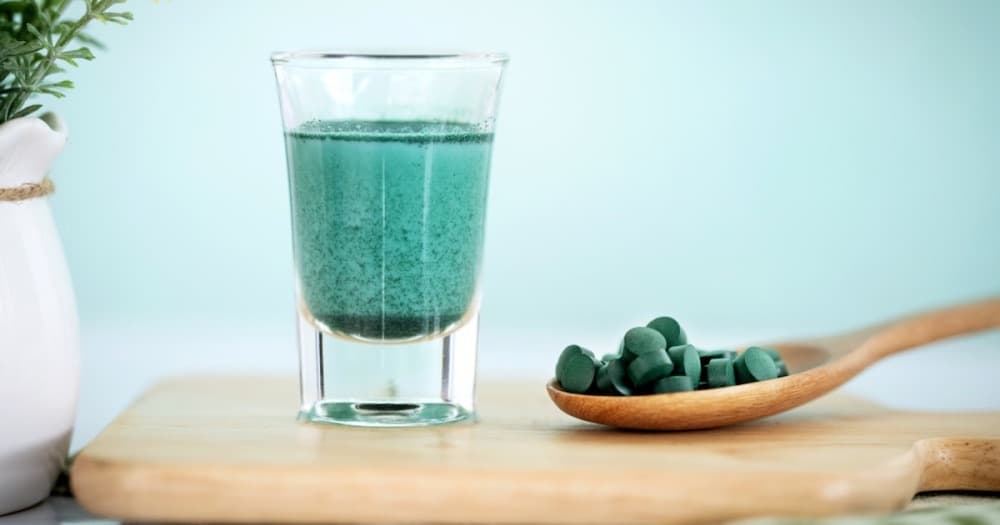🌿 Ultra-nutritious and recommended for vegetarians
The spirulina naturally contains almost all the nutrients our body needs. And it’s not just a simple mix of added nutrients; they work in synergy, strengthening each other.
The proteins it contains are richer than those found in other plant-based protein sources and are similar to those present in eggs. They provide us with all the essential amino acids.
Moreover, it is very high in vitamins from the B, E and K groups, as well as in minerals and trace elements. One tablespoon of spirulina contains 11% of the recommended daily intake of iron. It is also rich in essential fatty acids, omega-6 and omega-3.
It is therefore particularly recommended for people following a vegetarian or vegan diet.
These nutrients are complemented by a range of antioxidant pigments with protective and therapeutic functions for our body: chlorophyll, phycocyanin, carotenoids, provitamin A beta-carotene, whose numerous properties we will see below.
Lire aussi l Quelle est la meilleure spiruline sur le marché ?
🚴🏻♀️ Anti-fatigue and improves athletic performance
Spirulina is a powerful anti-fatigue as it helps to compensate for a large number of deficiencies—especially in vitamins and iron. Its daily consumption helps to fill these gaps that cause temporary fatigue or even anemia.
Moreover, it is a major asset for any sports practice, especially bodybuilding. Its high antioxidant content helps to combat oxidative stress caused by exercise, which is responsible for muscle fatigue.
It helps to rapidly develop muscle mass, promotes better endurance, and recovery.
This study by the Institute of Human Performance and Rehabilitation in Trikala, Greece, conducted on 9 men over 4 weeks, showed that spirulina increases endurance, fat burning, and reduces blood sugar levels.
This one from the Sport Science Research Center in Taiwan demonstrated that taking spirulina reduces muscle damage and promotes better recovery after physical exercise.
🛡 Strengthens the immune system
Spirulina boosts the immune system because it contains trace elements such as selenium and manganese, which strengthen our defenses.
It also contains an essential fatty acid, gamma-linolenic acid, which supports the proper functioning of the immune system.
This study from the University of California at Davis, conducted on 40 seniors, showed the improvement of immune functions following the consumption of spirulina for 12 weeks.
🥝 Source of antioxidants
Spirulina is naturally rich in phycocyanin, a highly antioxidant pigment. It gives it its beautiful blue-green color and is also used as a food coloring.
Chlorophyll—also found in matcha green tea and moringa leaves, and the carotenoids it contains are also powerful antioxidants, helping to fight against free radicals, and therefore against aging.
It thus helps to improve the appearance of the skin and promotes its cellular renewal. The antioxidants it contains, gamma-linolenic acid, phycocyanin, carotenoids, selenium, and zinc, act against skin aging by preventing the formation of free radicals.
The carotenoids present in spirulina ensure skin hydration as well as the production of melanin, protecting the skin from the sun and promoting its tanning.
This study conducted by the National Scientific Research Center of Havana demonstrated the powerful antioxidant properties of phycocyanin contained in spirulina.
🔬 Potentially anti-cancer
The extremely numerous antioxidants in spirulina help to prevent the onset of cancerous cells, reduce the size of certain tumors, and in some cases, cure them. Studies have been conducted on humans and animals, and the results are very encouraging.
This study conducted by the Regional Cancer Centre in Kerala, India, demonstrated that daily consumption of spirulina allows for better healing of subjects with precancerous cells in the oral mucosa.
🍳 Anti-cholesterol and aids in weight loss
Beta-carotene, abundantly present in spirulina, helps to reduce bad cholesterol. In addition, its high protein content allows for the replacement of meat and thus consumption of less fat.
Moreover, it contains phenylalanine, an amino acid that contributes to the sensation of fullness, as well as proteins that have an appetite-suppressing effect.
This Korean study from Foods R&D conducted on 78 seniors demonstrated that spirulina intake helps reduce cholesterol levels.
😷 Reduces allergic rhinitis
Thanks to its anti-inflammatory properties, spirulina reduces allergic rhinitis and nasal discharge.
This study from Eskisehir University of Medicine in Turkey demonstrated the benefits of spirulina on allergic rhinitis.
💎 Detoxifying
Spirulina is a powerful detoxifier, particularly due to the chlorophyll it contains. This allows the blood to oxygenate, rapidly eliminate toxins, and prevent the spread of viruses. It also helps maintain the body’s acid-base balance.
As such, it has similar benefits to aloe vera leaves and kudzu roots, two detoxifying plants that support liver function.
👩🦰 Strengthens and facilitates hair growth
The proteins contained in spirulina are also good for hair health as they directly affect the production of keratin.
It also contains zinc and vitamin B6, which have a strengthening and anti-hair loss effect. Moreover, its high carotenoid content helps to strengthen hair and nails.
Also read The benefits of spirulina for hair




